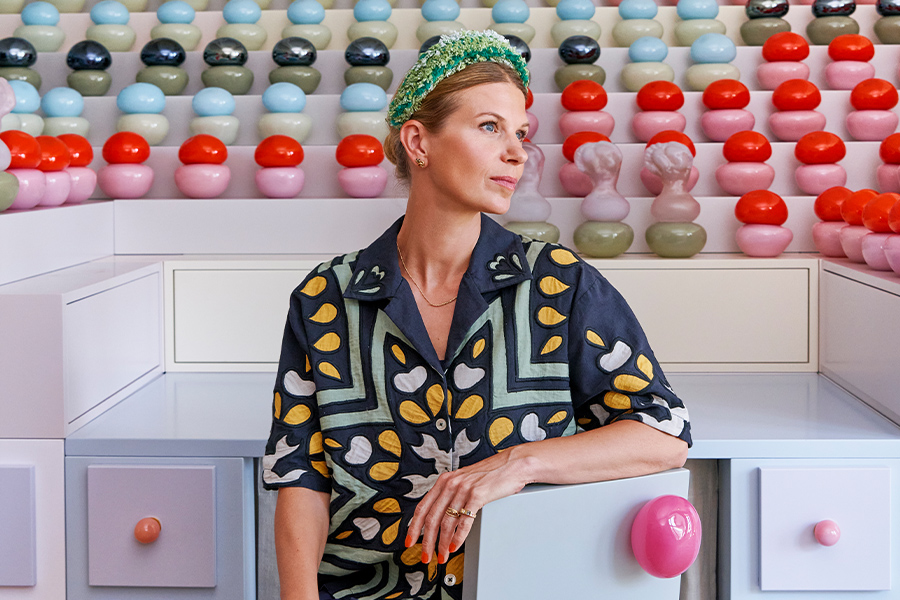Personal touch is everything. So, when the line between designer and owner is blurred, the result is a property that feels especially distinctive.
Here, we highlight five people who have shaped their hotels from top to bottom.
Jessica Whitley
Rivet House
 “I always felt Athens [Georgia] was missing a cool boutique hotel,” Jessica Whitley says of the idea that became Rivet House. Alongside her business partner James Whitley and Indigo Road Hospitality, she transformed a derelict denim mill into a 50-key destination. “Athens has a deep, vibrant history in music, sports, arts, and food,” James adds. “But it was missing a hotel that reflected that local spirit. We set out to create something rooted in Athens, one that adds to the cultural story of the city.”
“I always felt Athens [Georgia] was missing a cool boutique hotel,” Jessica Whitley says of the idea that became Rivet House. Alongside her business partner James Whitley and Indigo Road Hospitality, she transformed a derelict denim mill into a 50-key destination. “Athens has a deep, vibrant history in music, sports, arts, and food,” James adds. “But it was missing a hotel that reflected that local spirit. We set out to create something rooted in Athens, one that adds to the cultural story of the city.”
Jessica, who studied interior design at Louisiana State University, built a career in finance before leaving the corporate world to launch her eponymous Athens-based design studio. Rivet House was an opportunity for her to marry functionality and an intuitive sense of place. “The design needs to fit the space,” she explains. “For me, it’s about the function first, then the aesthetics around it.”
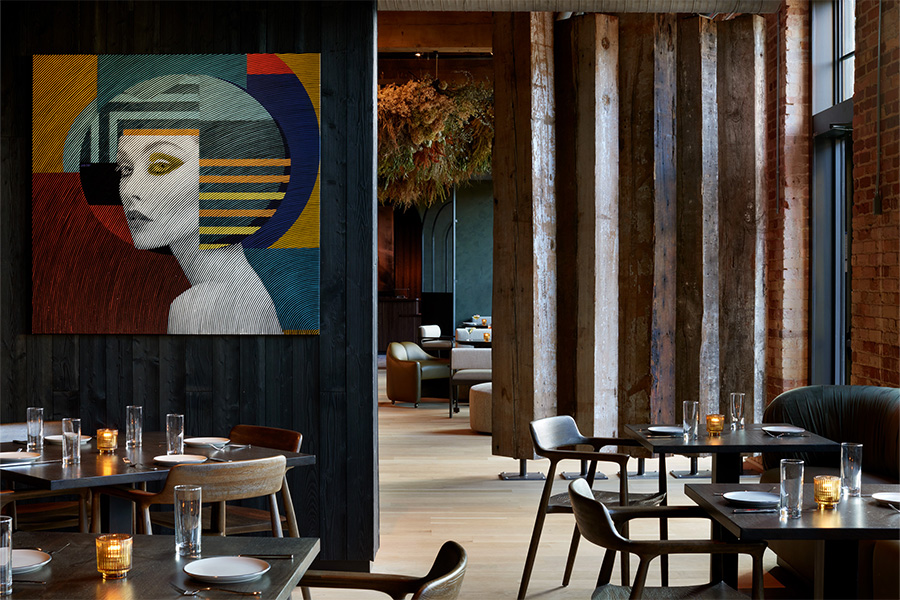
Reclaimed beams form a suspended partition between Rivet House’s restaurant and bar
At Rivet House, that starts at the dramatic yet welcoming arrival. Here, guests pass under creeping wisteria and twinkling lights into a courtyard where reclaimed beams from the building’s past life now accent the terrace. In the lobby, a patterned concrete floor and walnut reception desk with marble inlay sit against dark shou sugi ban walls, warmed by natural light. Behind the desk, a portrait by local photographer Jim Fiscus sparks curiosity, along with additional artwork—some from Jessica’s personal collection, some made with her daughter—throughout.
Being both designer and owner brings freedom and pressure, however. “I love to collaborate, and I want people to give me a lot of opinions, but sometimes that becomes a challenge,” she says. “At the end of the day, you get to make the choice.”
Jade-Snow Carroll
Prospect
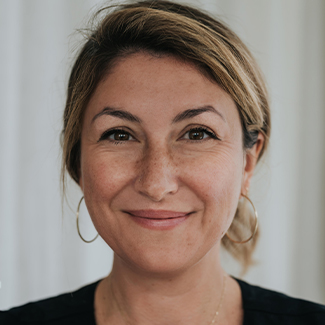 Jade-Snow Carroll grew up two miles from where she and her husband, Ian Rasch, would open Prospect, a nature-immersive destination in the Berkshires of western Massachusetts. In 2021, the couple purchased a historic 150-acre property in Egremont—once a 19th-century picnic ground and later a beloved campground—which also included an 1870-built house, now occupied by Prospect’s main gathering space, Cliff House.
Jade-Snow Carroll grew up two miles from where she and her husband, Ian Rasch, would open Prospect, a nature-immersive destination in the Berkshires of western Massachusetts. In 2021, the couple purchased a historic 150-acre property in Egremont—once a 19th-century picnic ground and later a beloved campground—which also included an 1870-built house, now occupied by Prospect’s main gathering space, Cliff House.
Along with Alander Construction—co-owned by Rasch and partner Roman Montano—they built a property embedded in its surroundings. “The landscape is part of the experience,” Carroll explains. The Yale School of Forestry and landscape architecture firm Andropogon devised a rewilding plan, while landscape designer Raina Weber, a high school friend of Carroll’s, created a planting strategy centered on native species.
Prospect’s 49 minimalist cabins (designed with Zook Cabins, an Amish builder in Pennsylvania) are clad in cedar, with white pine interiors and expansive windows to keep the outdoors ever-present. “I wanted to make it as quiet as possible,” Carroll says. “I didn’t put much artwork on the walls because I wanted the landscape to be what you’re contemplating.”
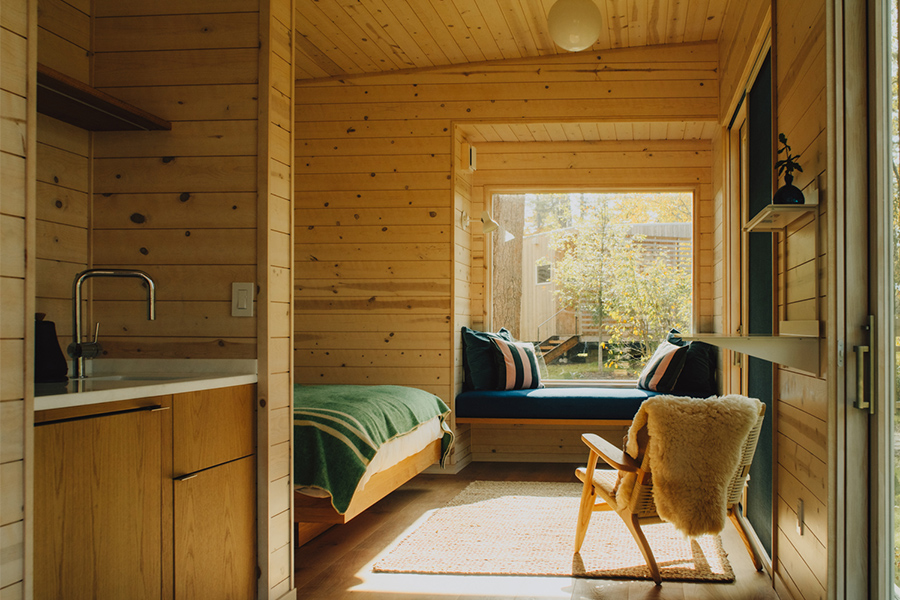
A cozy cabin nook frames outdoor views
That sense of groundedness extends to Cliff House. The heart of Prospect, it comprises a retail shop, lounge, and restaurant by Mezze Hospitality. “I want it to be anchored in the community,” she says. Perched on a bluff with sweeping lake views, the original structure was rebuilt from its American chestnut frame. Inside, cedar-clad walls are warmed by Murano glass pendants, brass detailing, a ceiling mural, and pale pistachio walls.
“Even though we’re tired, we’re lit from it—it’s almost addictive,” Carroll says of opening her own property. “People visit and feel inspired, and we’ve been floating on their excitement.” The days can be long, but she wouldn’t trade them. “Honestly,” she says, “sometimes it feels like a dream.”
Jessica Pell
Hotel Wren
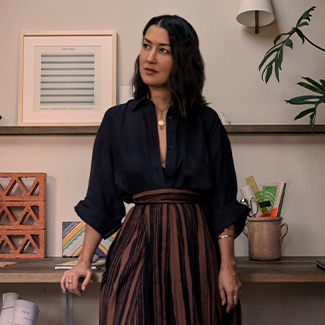 Kismet might be the most suitable word for how Jessica Pell, founder and principal of Manola Studio, came to co-own Hotel Wren in Twentynine Palms, California. Originally, she was renovating the 1940s motor lodge property, formerly the Circle C Lodge, for friends who had a boutique hospitality group, but two years in, those friends shifted their business focus and stepped away. Feeling invested in the project by this point, Pell became an accidental hotelier for the first time, in partnership with her frequent collaborator, real estate investor Cyrus Etemad.
Kismet might be the most suitable word for how Jessica Pell, founder and principal of Manola Studio, came to co-own Hotel Wren in Twentynine Palms, California. Originally, she was renovating the 1940s motor lodge property, formerly the Circle C Lodge, for friends who had a boutique hospitality group, but two years in, those friends shifted their business focus and stepped away. Feeling invested in the project by this point, Pell became an accidental hotelier for the first time, in partnership with her frequent collaborator, real estate investor Cyrus Etemad.
What made this transition feel destined, however, was the regular trips Pell made to Joshua Tree National Park as a child. “I remember being enchanted by the landscape and the surreal stillness. Even as a child, it felt like a sacred place,” she says. This reverence informed the hotel’s design.
“There was a vintage rhythm to the existing property that felt worth preserving,” Pell says. She meticulously re-glazed the original steel casement windows, for one. Her team also preserved an old drive-thru carport—a relic of the motor lodge era—and the spatial layout and bones of the property’s 12 generously sized rooms, which are still oriented toward a courtyard and the mountains beyond.
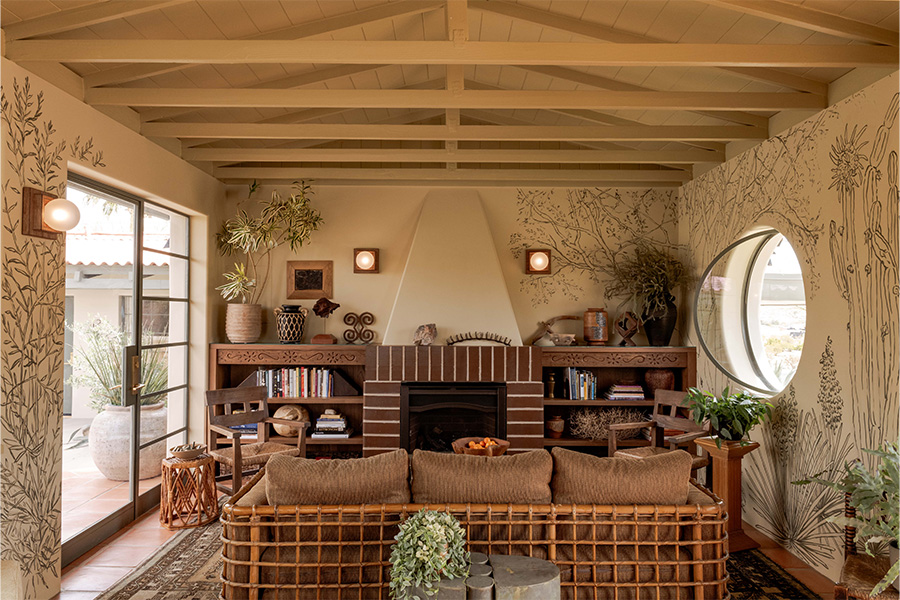
A fireplace anchors the lobby lounge at Hotel Wren
Meanwhile, newly added touches create a home-like feel. The hotel’s updated palette takes inspiration from the desert’s natural tones of bone, clay, adobe pink, and rust and carefully curated vintage furnishings are low-slung, sun-washed, and restrained to let the landscape speak for itself. The design team also converted a newer, out-of-place structure that existed on the site into the hotel’s lobby, furnishing it like a comfy living room.
When it came time to name the hotel, Pell recounts spotting a pair of cactus wrens nesting in a silver cholla on the property. She’d seen many species of bird in the area, but never cactus wrens, and knew of how they cautiously choose where to nest to keep their fledglings safe from predators. “I was thrilled they found their way into our gardens, and at that moment, it felt like a sign that they had chosen this place, and in a quiet way, were giving us permission to do the same.”
Liz Biden
Masiya’s Camp
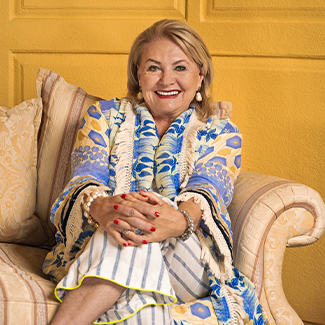 Since Liz Biden entered the hospitality world at the age of 50, she has become one of South Africa’s most celebrated hoteliers, known for a rule-breaking approach to design that has shaped the Royal Portfolio, now a collection of four lodges and one tented camp she owns with her husband, Phil.
Since Liz Biden entered the hospitality world at the age of 50, she has become one of South Africa’s most celebrated hoteliers, known for a rule-breaking approach to design that has shaped the Royal Portfolio, now a collection of four lodges and one tented camp she owns with her husband, Phil.
Biden’s career path was wide and varied. She designed jewelry, ran a traveling disco, became a teacher, and cofounded South African clothing brand Jenny Button. The business flourished, but when she sold her share, she decided to retire. “It was never the plan to go into hospitality, but I knew that when I sold my fashion business, it wouldn’t last long,” she recalls. Her retirement lasted only two days.
In 1999, she and Phil opened their first property together, the Royal Malewane. “I loved the process so much that three years later, we converted our holiday home in Hermanus into a boutique hotel now known as Birkenhead House,” she says. Over the next decade, the Royal Portfolio expanded to include La Residence in Franschhoek and the Silo Hotel in Cape Town, each marked by Biden’s eye for bold design.
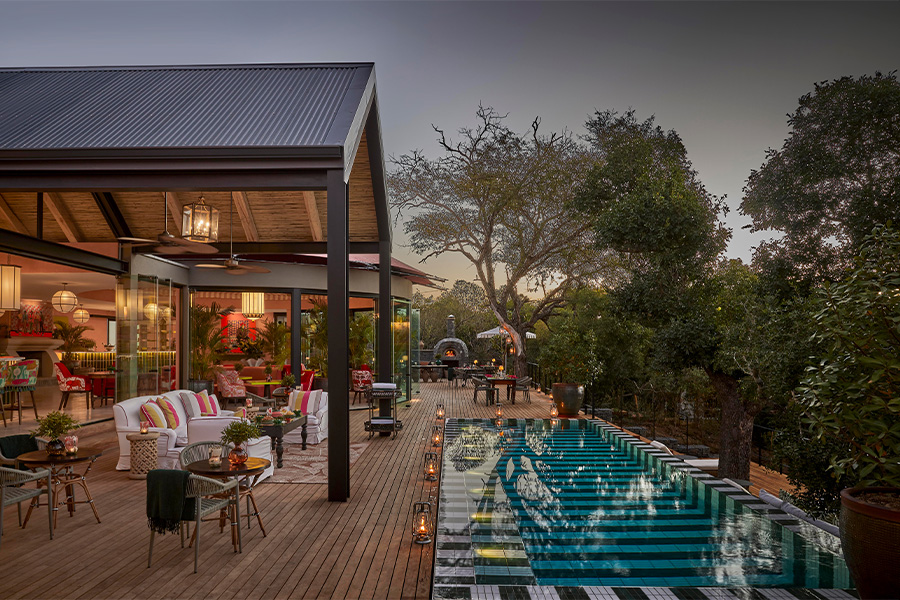
Each tented suite at Masiya’s Camp opens to a private deck with a heated plunge pool
Their latest opening is Masiya’s Camp, located in Thornybush Nature Reserve, part of the Greater Kruger National Park in South Africa. The brand’s first tented property, it eschews the traditional safari neutrals for something more “bold, fun, and exciting,” she says. Far from typical, Masiya’s bursts with color and character, with each tent layered with textiles from her vast collection, amassed during her travels around the world. As with all her projects, the design is instinctive rather than bound to any rules. “I get to choose things that I like,” she says.
With her son Matthew as CEO and daughter Ali chairing the Royal Portfolio Foundation, the family-run business is still guided by Biden. A boutique hotel in the Bahamas is already on the horizon. “There are no responsibilities that feel too difficult,” she says. “I have an incredible team behind me.”
Sangeetha Ramkumar
Dunya Camp
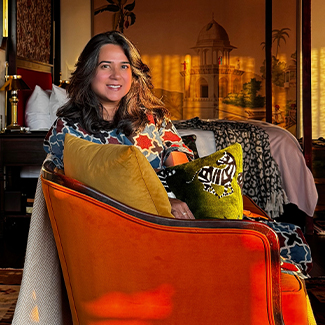 The idea for Dunya Camp started to percolate when Sangeetha Ramkumar and her husband, Saeid Kazerooni, took a three-day camping trip through the Tetons and Yellowstone. “It was so beautiful,” says Ramkumar. “But going back to a hotel afterward made us feel boxed in.”
The idea for Dunya Camp started to percolate when Sangeetha Ramkumar and her husband, Saeid Kazerooni, took a three-day camping trip through the Tetons and Yellowstone. “It was so beautiful,” says Ramkumar. “But going back to a hotel afterward made us feel boxed in.”
In response, Ramkumar conceived of Dunya Camp, a luxe indoor-outdoor retreat spanning 42 secluded acres atop a mountain ridge in northwestern Georgia.
The project marked a dramatic shift from Ramkumar’s corporate career, which included more than a decade at IHG, where she rose to global design director for the luxury portfolio, followed by the launch of her own consulting firm, Satori@20. “I was always fascinated by style and the way it reflects how society changes over time,” she says.
Raised in southern India, she visited construction sites with her mother and was obsessed with Lego. While at Georgia Tech, a formative year in Paris deepened her understanding of architectural history and design. But it was an ELLE Décor article on Kit Kemp and the Haymarket Hotel that sealed her path. “I was floored,” she recalls. “I didn’t know what this was, but I wanted to be part of it.”
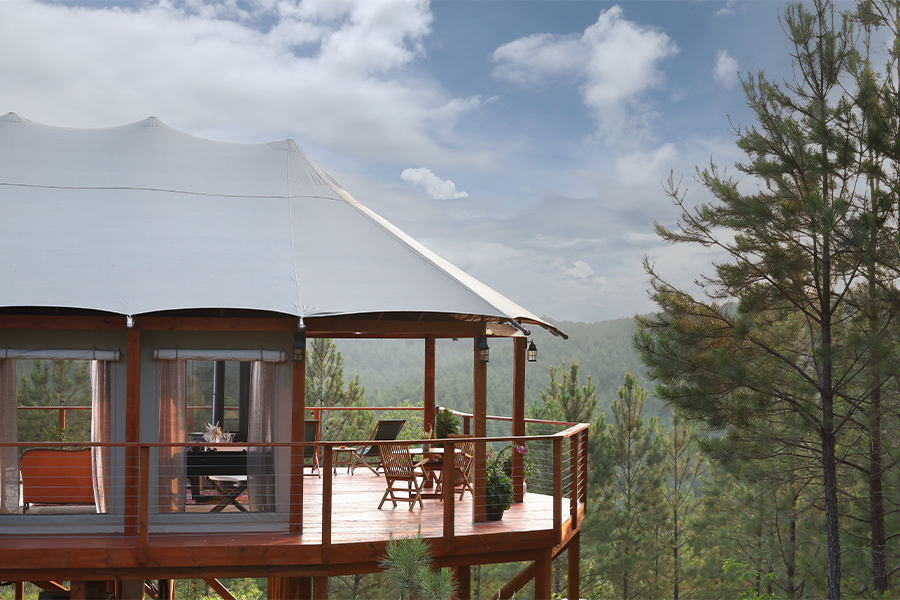
Elevated decks capture sweeping views of the mountains
Ramkumar and Kazerooni designed the six-tent camp as an intimate sanctuary with a hot tub, firepit, and, in some cases, a sauna. “It’s very transportive,” she says, referencing the murals adapted from an 1800s travel guide, locally sourced antiques, and a Persian ceiling motif printed onto the tent canopy, which nods to her husband’s roots. “We wanted to pay homage to where we came from,” she says.
As they move into phase two, which will add a pool and communal spaces, Ramkumar remains intentional. “We’re putting our energy into this one to make it bigger and better,” she says. “It’s quite a transformative experience. We all have special skills to be of service to the world, and I’m glad I got to use mine and see how it impacts people.”
Photos by Mali Azima, Greg Cox, Allie Goldberg, Kathryn McCrary, Cole Wilson, and courtesy of Dunya Camp and Jessica Pell
This article originally appeared in HD’s September 2025 issue.


